No parent should have to bury their child. And to bury two is unthinkable.
Yet that is the nightmare that became reality for Aberdeen couple Stephen and Kerry-Lee West.
But there are few things stronger than the human spirit, and they are sharing their story today to show it is possible to live a full life in spite of the most heartbreaking trauma.
They want their story to help others in similar situations, and to encourage people to keep talking.
As Stephen, 36, said, men are notoriously bad at showing emotion, particularly in the ‘macho’ world of the offshore industry.
This is something both he and Kerry-Lee want to change.
From ‘tears of joy’ to ‘something’s wrong’
Kerry-Lee, 40, has been pregnant eight times. Most have been miscarriages but two, tragically, ended in stillborn births.
Having been trying for children for five years with the help of fertility treatment, in 2014 the pair’s wildest dreams came true when Kerry-Lee discovered she was pregnant.
“We really wanted a family,” said Kerry-Lee, “and it had been such a long process. I thought, ‘oh my God, it’s happened’.”
The couple stood in the kitchen crying tears of joy.
The 12-week scan passed without incident, and at 17 weeks they found out the baby was a girl. They already had a name ready. Olivia.
But the very next day, Kerry-Lee realised something was wrong.
Keen golfer Stephen was lining up a putt on the golf course when his wife phoned.
“All I remember was Kerry crying down the phone saying ‘something’s wrong, something’s coming out of me’.”
Kerry-Lee was rushed to hospital, where a premature rupture of membranes was diagnosed. This is when the waters break early.
Stephen takes up the story.
Olivia. ‘Our world stood still’
“We were now faced with the decision to let nature take its course or ‘take a tablet’.
“But we had just heard her heartbeat, so in our eyes if she was fighting we would fight too.
“This went on for a few days, hearing the heartbeat and thinking we’d made the right choice. She can do this, I kept thinking, she is fighting so hard.”
Ultimately, she didn’t make it. Kerry-Lee gave birth, but Olivia never took a breath, and was stillborn. At 156 grams, she weighed less than a tube of Pringles, as Stephen described it.
“Our world stood still,” he said. “I didn’t know where to turn to, where to go.”
Life after the death of a child: ‘It was hard facing people again’
One thing he did learn, however, was the power of talking it out. He went to his best friend’s house and talked things through over a beer, with the football on in the background.
And he was taken aback by the reaction from colleagues when he returned to work.
“Men generally don’t know how to talk about those sorts of things. But when I started sharing what had happened, guys were telling me about things that had happened to them which I’d had no idea about. And I’d known them for over 10 years.”
But how do you return to day-to-day life after the loss of a child?
“It took time,” said Kerry-Lee, who decided to leave her job at a children’s clothing store.
“It was just hard facing people again. We were so over the moon we were pregnant, it was all we were talking about. It was such a huge thing for us.”
Stephen added: “We’d plastered it over Facebook, with us holding the scan. So then having to tell everyone what had happened, that was really difficult.”
‘There’s no heartbeat’
But Stephen and Kerry-Lee didn’t give up on their dream of starting a family. Lo and behold, in February 2015, Kerry-Lee found out she was pregnant again.
Delighted but ‘terrified’ (“the fear was intense, I was scared to do anything,” said Kerry-Lee), the couple were relieved to discover that this time, the pregnancy appeared to be progressing well.
“Everything was fine throughout the pregnancy,” said Kerry-Lee. “All very normal and straightforward, no symptoms of anything bad. I was feeling the baby move and kick.
“Then one night I couldn’t feel anything. In the morning I was in a lot of pain, a lot of cramping, and I still hadn’t felt any movement.
“I phoned the midwife and she told me to come straight in. Stephen was abroad working, and I was in so much pain I couldn’t drive, so my auntie had to take me to the hospital.
“They did a scan and they said ‘there’s no heartbeat’. The pain I was feeling was my body going into labour because it knew something was wrong and was rejecting the pregnancy.”
At 26 weeks, Kerry-Lee gave birth to Aimee. The couple’s second stillborn child.
Breaking down again and again
This time, Stephen was three flights away, working in Anchorage, Alaska.
“Kerry never phones when I’m working away,” said Stephen. “It’s always a text, so I knew something was wrong.”
After receiving the devastating news, he phoned his boss and within five minutes had flight confirmations to get back to Aberdeen. He went straight to the airport.
“I just broke down. Burst into tears. Just numb.
“On the second flight, from Minneapolis to Schipol, there was a woman sat next to me, and it was an experience meeting her. She was super lovely, and got me through that flight.
“I broke down again, and explained everything that happened. She started crying and said a prayer for me. I wish I got her details to thank her.
“When I finally got to the airport at Aberdeen, my parents were there to pick me up, and when I saw them I just broke down again. It was horrible.”
‘You can’t help but blame yourself’
Kerry-Lee said: “Being in that situation, you can’t help but blame yourself. It’s my body that isn’t holding on to these pregnancies.
“I was apologising to Stephen for not being able to make him a father, but Stephen was apologising to me for not being there, thinking ‘what if I’d been there to take Kerry to the hospital sooner’.”
Both Olivia and Aimee are buried in Hazlehead Cemetery.
Kerry-Lee drives past every day on her way to work, and Stephen does the same every Saturday on his way to the golf course.
“I always look over,” said Kerry-Lee. “Every single time. It maybe sounds a bit deep, but I like to think they’re with me in my day-to-day life.”
‘I’m still numb thinking about it. It tears a piece of you away’
Just what is it like to bury your own child once, never mind twice?
“It’s absolutely gut-wrenching,” said Stephen. “I’m still numb thinking about it. I wouldn’t wish it on anyone. It tears a piece of you away.”
Kerry-Lee added: “You don’t ever expect to have to do that. The amount of babies you see at that cemetery is just heartbreaking. You don’t realise how many people are going through the same thing, until you see that.
“It is hard. Especially when you see other people having kids without problems. You’re over the moon for them, but it still kind of hits you: ‘why couldn’t it have been like that for us?'”
Stephen said: “I’ve got nieces and nephews, and seeing them grow up I’ll sometimes think ‘what would Olivia and Aimee be like?’ I think about them daily.”
‘Don’t bottle it up, don’t cower away’
The couple have now come to terms with the fact that having children ‘just wasn’t meant to be for them’. They’ve got two rottweilers and say they have come to appreciate the freedom that comes with it being just them.
They wanted to tell their story for two reasons. To let others in the same situation know they’re not alone. But also to get men talking.
Asked what he’d say to other men going through trauma or bereavement, Stephen said: “Talk with each other. Don’t bottle it up. Don’t cower away, just talk, even to your friends.
“Man Chat‘s brilliant, if you’re feeling down you can just go along and have a chat with someone.
“But talk with each other, or you’ll end up tearing each other part.
“We’ve always had that communication with each other. If we didn’t have that then I don’t think we’d be sitting here together.”
We want men to open up and show emotion: ‘If telling our story helps one person, I’m happy’
Kerry-Lee said: “A lot of men don’t talk about things enough. A lot of people were asking ‘how’s Kerry doing?’ Because I had been through it physically, a lot was focused on me. But they forget about the father, he’s had the loss as well.”
“A lot of people at Stephen’s work came out and said ‘My wife went through this’ or ‘We went through that’. There’s all these stories but people don’t talk about it.”
Stephen stepped in: “Because there’s that stigma that men have to be men and can’t show emotion. Especially in the offshore industry.”
“If us telling our story helps one person, even if it’s an older person who went through it 20 or 30 years ago, then I’m happy. Knowing that someone else has gone through the same thing is massive.”
For anyone out there in need of help, Stephen and Kerry-Lee recommend Sands (Stillbirth and Neonatal Death Charity), a “great charity” which they have both raised money for in recent years.
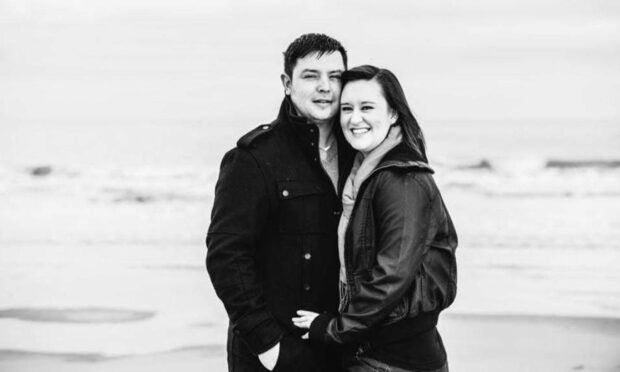
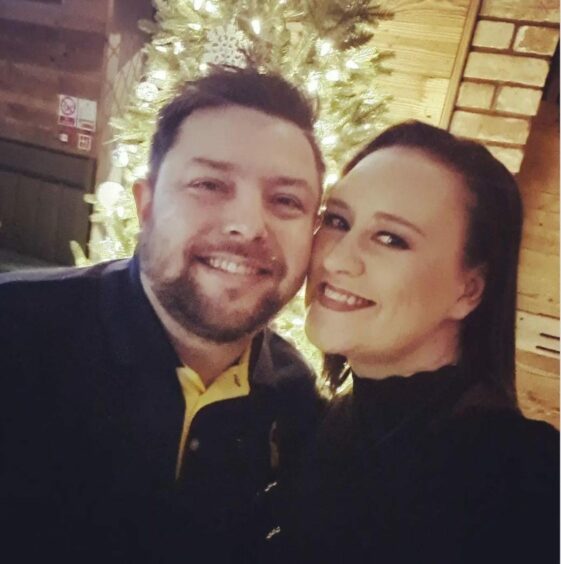
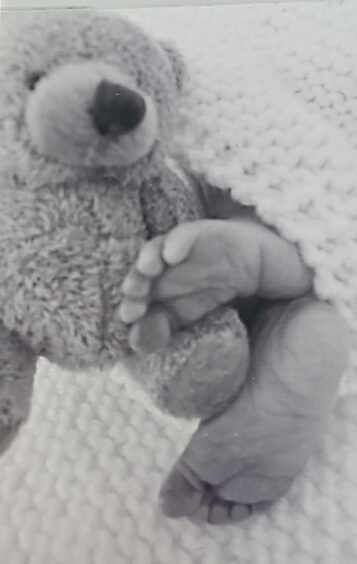
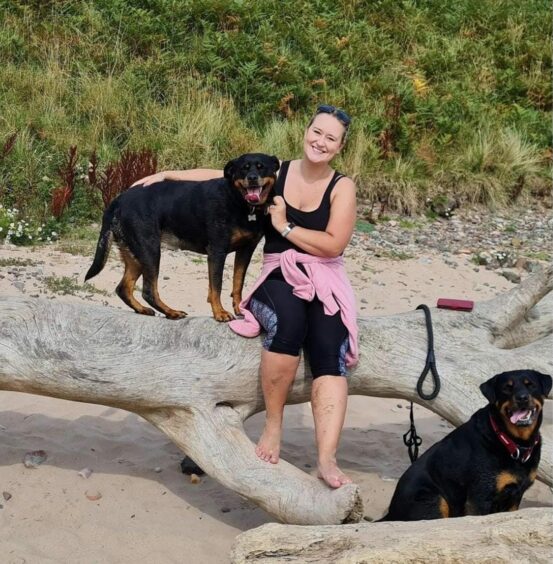
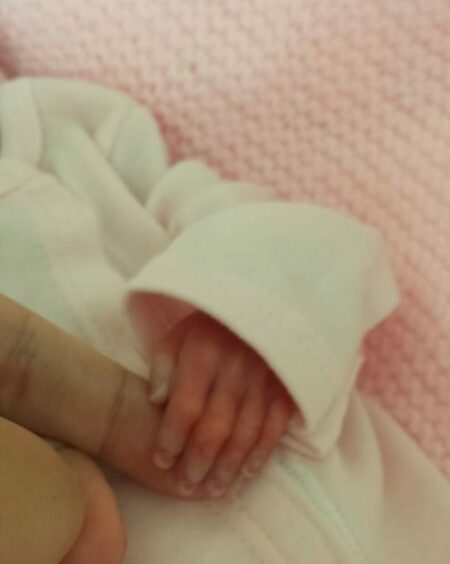
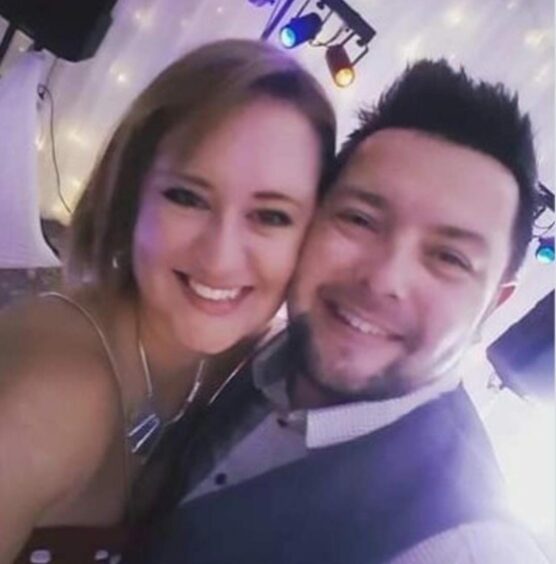

Conversation